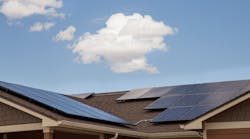Washington State is delaying the adoption of three 2014 National Electrical Code (NEC) requirements for new solar photovoltaic systems until July 1, 2016. The three requirements are related to Sections: 690.11 [Arc-Fault Circuit Protection (Direct Current)]; 690.12 [Rapid Shutdown of PV Systems on Buildings]; and 705.12(D)(6) [Wire Harness and Exposed Cable Arc-Fault Protection]. Oregon has a similar delay in implementation of these rules.
According to a note from the Washington Chief Electrical Inspector, “This approach will ensure that the products currently under development to meet these requirements will be certified by an accredited product testing laboratory as meeting appropriate electrical product safety standards.”
This delay brings a huge sigh of relief for the Washington solar industry, according to the Artisan Electric blog. "The lack of integrated products available to meet these requirements meant that most new systems would need to be retrofitted, increasing the cost of installations for the first time in years. Artisan is scheduling solar installations well into August, which means we will not be required to charge new customers an unnecessary additional fee."
Due to the delay in implementation of the new rapid shutdown requirements, the 2011 NEC requirement to route direct current PV source and output circuits at least 10 in. below roof decking or sheathing when installed inside a building [Sec. 690.31(E)(1)] will still be enforced until the new requirement takes effect on July 1, 2016, the Chief Inspector noted.



